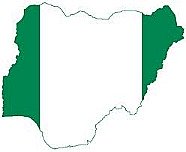Nigerian Foods
What They Are And How To Prepare Them

Nigerian foods are diverse and exciting. They are often unrefined natural foods, rich in dietary fibers, low GI carbohydrates and a wide range of highly nutritious and vitamin rich combination.
When people talk about foods eaten in Africa in general, and Nigeria in particular, they tend to forget that items highly sought after in Western countries like cassava, yams, plantain, palm oil, coconut and coconut oils, Nigerian brown beans, and rice do not grow in the West.
Most of these items come in from Africa, Asia and South America, yet they make up the bulk of Nigerian and African foods. What about those tropical fruits like oranges, tangerines, mangoes, pawpaw, African bread fruit, banana, African bush mango, carrots, to name but a few, these are everyday food items that make up the Nigerian food dish.
The list of foods eaten in Nigeria is literally inexhaustible. Being the most populous country in Africa, with about 160,000,000 inhabitants (population of 160 million) and over 500 totally different ethnic groups and languages (according to Wikipedia), all reflecting different cultures, cutting across different natural geographic zones including the Sahara desert, the Green Savanna, the thick Tropical Rain Forest, with different soil tendencies and properties, it is easy to see how diverse the staple food across the vast region called Nigeria could be.
A list of common Nigerian foods that cuts across most of the above lines, covering the major ethnic groups in nigeria, including Hausa, Yoruba, Igbo, Ijaw, Urhobo, Efik, Ibibios, Itsekiris, Binis, Ishans, Idomas, and many others, include:
- Nigerian Stew
- Afang Soup
- Banga Soup or Palm Fruit Soup
- Bitter Leaf Soup
- Egusi Soup also called Melon Soup
- Edikang Ikong Soup
- Okro Soup
- Ogbono Soup
- Gbegiri Soup
- Melon Peppersoup
- Atama Soup
- Groundnut soup
- Ofe Nsala
- Ofe Onubu (Bitter leaf soup)
- Ofe Oha
- Ewedu soup
- vegetable sauce
- Owo soup
- Gbagbaofofo
- Epuroo
- Green leaf Sauce
- Miyan kuka
- Miyan kabewa
- Miya yakwa
- Miya taushe
- Yam porridge
- Plantain Porridge
- Potato porridge
- Beans porridge
- Asa Iwa
- Ekpang Nkokwo
- Pepper Soups with fish, goat meat, chicken
- Nkobi
- Isi ewu
- Akara
- Moi Moi
- Jollof rice
- White Rice
- Fried Rice
- vegetable rice
- Eba
- Pounded Yam
- Amala
- Tuowo Masara
- Egun Obobo
- Fried Plantain or Dodo
- Lafun or Cassava fufu
- Cassava Fufu
- Asa Ibibot (Corn kernel Porridge)
- Akara Mboro (Banana balls)
- Akamu, Ogi or Pap
- Abacha Ugba (African Salad)
The above list is not exhaustive as mentioned earlier. If you have a Nigerian food recipe item you are looking for or you want to show up here, you can submit it using the discussion box below.
Why Nigerian Foods?
For Nigerians in Nigeria, it is obvious that they will continue to enjoy the delicacies of their inheritance, with it's attendant health benefits. They need to be confident that well prepared African food, be it Nigerian or Ghanaian, or Zimbabwean, is rich in nutrients and constitutes a very balanced source of carbohydrates, proteins, fat, minerals, and essential vitamins.
For the Nigerian in diaspora, and even more so for their offspring born abroad and living in the West, it is important that they do not relegate their Nigerian food dishes to the background, in favour of Western diets. This is strictly for health and nutritional reasons. Medical evidence abounds that the unrefined African food is superior in helping to maintain good health.
Below are evidence based scientific reasons why you should regularly include Nigerian food items in your menu if you can. We shall discuss a few of the African food items that make up a typical Nigerian food dish.
- Plantain
Plantain is a component of many Nigerian food recipe, like plantain porridge, dodo and rice, plantain fufu, epuoruo, boiled plantain and pepper soup serving, and more. This is eaten regularly across Southern, Eastern and Western Nigeria. It has been shown to be rich in low GI carbohydrate (good for weight loss diet, and for diabetic patients) that helps in ensuring a slow release of energy over extended period of time. More recently, it has been demonstrated in many studies to be rich in soluble plant fibres that helps protects the gut against many infections, and even against Crohn's disease (Nature Reviews Gastroenterology and Hepatology Journal, 2010 - nature.com). If you suffer with Crohns disease, try plantain in your diet for six months and see how it will help. - Cassava
Cassava is almost "ominipresent" in Africa and certainly in Nigeria. From it comes a vast range of Nigerian food recipes like gari, eba, lafun, tapioca, cassava dough, cassava fufu, boiled cassava meal, starch served with banga soup, cassava chips, cassava based bread, ...Cassava is world acclaimed to be gluten free. It is a good substitution for bread, and wheat products, in the diet of those who suffer with coeliac disease, and other related gluten "enteropathies". It is also very rich in dietary fibre, and it is again a low GI carbohydrate. It is superior to potatoes, wheat, and rice in this regard. - Bitter leaf
Bitter leaf is simply the leaf of the plant called Vernonia amygdaline. It is proven to be very rich in phytochemicals that protects the body against various cancers and help in the treatment of liver cancer in particular. A few years ago, a UK journal carried the following heading, "A diet Rich In Phytochemicals Offers Best Anticancer Effects", showing that this often ignored Nigerian vegetable has yet untapped potentials (Journal - Oncology Times: 25 September 2005 - Volume 27 - Issue 18 - p 36-37).
Time and space will fail us if we were to list other components of Nigerian food items like Ogbono that is shown to be very good weight loss agent, as well as a good aphrodisiac (sexual enhancing agent). Palm oil, that is now recognized to offer protect from heart attacks, Nigerian honey beans, yam, cocoyam that are now finding place in many western diets.
Nigerian honey beans for example is a uniquely sweet beans, that if you taste it once, you will never touch baked beans again or any type of beans.
Nigerian Foods: Have Your Say
Do you have a fantastic Nigerian food recipe to share with visitors to this site? Or are you looking for help with a recipe you have always wanted to prepare for your spouse or self? Share your thoughts here. Leave comments on Nigerian food recipes. Have your say!
Please feel free to comment on postings submitted by other users below.
Want regular updates on African cuisines and food recipes? What about unique health information about these foods - what to eat and avoid to keep healthy from the list of African recipes available?
Fill in the form below to subscribe to our Newsletter - AfricanFoods Weekly?
Worried about spamming? We are too. We will never ever give or pass on your information to anyone else. We will only use your email address to send you your copy of our weekly newsletter. We do have a zero tolerance to spam. We subscribe to a very strict policy on the handling and use of information we gather on this site! We also get paid for affiliate links on this site. See our privacy policy for further details.
Follow us on social media:
Get Our Weekly Newsletter. Subscribe Today. It's FREE.
Subscribe to African Foods Weekly
Get African food recipes, cooking tips, and healthy eating info delivered to your inbox every week. Simply fill in your email below and click SUBSCRIBE .
(Your information will not be shared)










New! Comments
Have your say about what you just read! Leave me a comment in the box below.